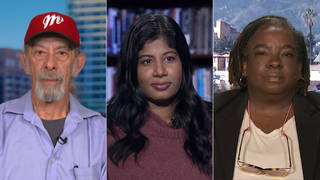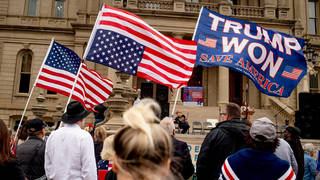
Tuesday’s hearing of the House committee investigating the January 6 attack included evidence of how then-President Trump and his campaign “were directly involved” in a plot to replace Biden electors with fake electors for Trump in states where he had lost. Investigators displayed fake certifications manufactured by the Trump campaign and said that one group of fake electors even asked for a promise that the campaign would pay their legal fees if they got sued or charged with a crime. The committee also revealed that just minutes before the joint session on January 6, a staffer for Wisconsin Senator Ron Johnson told Mike Pence he wished to hand deliver to the vice president the fake electors’ votes from Michigan and Wisconsin — which Pence’s aide unambiguously refused. We feature a video presented to the January 6 committee as evidence that features Casey Lucier, an investigative counsel, describing the plan to organize fake electors for Trump in states where he had lost, with testimony of former Trump staffers, lawyers and other Republican officials.
Transcript
AMY GOODMAN: This is Democracy Now! I’m Amy Goodman.
During Tuesday’s hearing of the House Select Committee to Investigate the January 6th Attack on the U.S. Capitol, members laid out the argument that then-President Trump and his campaign “were directly involved in advancing and coordinating the plot to replace Biden electors with fake electors not chosen by the voters.”
This is a video presented as evidence that features Casey Lucier, an investigative counsel for the committee, describing the plan to organize fake electors for Trump in states where he had lost. It includes testimony of former Trump staffers who were involved in or aware of the plot, and lawyers and Republican officials who warned against it.
CASEY LUCIER: My name is Casey Lucier. I’m an investigative counsel for the House Select Committee to Investigate the January 6th Attack on the United States Capitol.
On November 18th, a lawyer working with the Trump campaign, named Kenneth Chesebro, wrote a memo arguing that the Trump campaign should organize its own electors in the swing states that President Trump had lost. The select committee received testimony that those close to President Trump began planning to organize fake electors for Trump in states that Biden won in the weeks after the election.
INVESTIGATOR: Who do you remember being involved in those early discussions around the Thanksgiving time regarding having alternate electors meet?
CASSIDY HUTCHINSON: Mr. Giuliani, several of Mr. Giuliani’s associates, Mr. Meadows, members of Congress — although it’s difficult to distinguish if the members I’m thinking of were involved during Thanksgiving or if they were involved as we progressed through December.
CASEY LUCIER: At the president’s direct request, the RNC assisted the campaign in coordinating this effort.
INVESTIGATOR: What did the president say when he called you?
RONNA ROMNEY McDANIEL: Essentially, he turned the call over to Mr. Eastman, who then proceeded to talk about the importance of the RNC helping the campaign gather these contingent electors in case any of the legal challenges that were ongoing changed the result of any of the states. I think more just helping them reach out and assemble them, but that — my understanding is the campaign did take the lead, and we just were helping them in that — in that role.
CASEY LUCIER: As President Trump and his supporters continued to lose lawsuits, some campaign lawyers became convinced that convening electors in states that Trump lost was no longer appropriate.
JUSTIN CLARK: I just remember I either replied or called somebody, saying, “Unless we have litigation pending that’s, like, in these states, like, I don’t think this is appropriate, or, you know, this isn’t the right thing to do.” I don’t remember how I phrased it, but I got into a little bit of a back-and-forth, and I think it was with Ken Chesebro, where I said, “All right, you know, you just get after it. Like, I’m out.”
MATT MORGAN: At that point, I had Josh Finley email Mr. Chesebro politely to say, “This is your task. You are responsible for the Electoral College issues moving forward.” And this was my way of taking that responsibility to zero.
CASEY LUCIER: The committee learned the White House Counsel’s Office also felt the plan was potentially illegal.
INVESTIGATOR: And so to be clear, did you hear the White House Counsel’s Office say that this plan to have alternate electors meet and cast votes for Donald Trump in states that he had lost was not legally sound?
CASSIDY HUTCHINSON: Yes, sir.
INVESTIGATOR: And who was present for that meeting, that you remember?
CASSIDY HUTCHINSON: It was in our office, so it was Mr. Meadows, Mr. Giuliani and a few of Mr. Giuliani’s associates.
CASEY LUCIER: The select committee interviewed several of the individual fake electors, as well as Trump campaign staff who helped organize the effort.
ROBERT SINNERS: We were just, you know, kind of — kind of useful idiots or rubes at that point. You know, a strong part of me really feels that it’s just kind of as the road continued and as that was failure, failure, failure, that that got formulated as “What do we have on the table? Let’s just do it.”
CASEY LUCIER: And now, after what we’ve told you today about the select committee’s investigation about the conclusion of the professional lawyers on the campaign staff, Justin Clark, Matt Morgan and Josh Finley, about their unwillingness to participate in the convening of these electors, how does that contribute to your understanding of these issues?
ROBERT SINNERS: I’m angry. I’m angry, because I think — I think, in a sense, you know, no one really cared if — if people were potentially putting themselves in jeopardy.
CASEY LUCIER: Would you have not wanted to participate in this any further, as well?
ROBERT SINNERS: I absolutely would not have, had I known that the three main lawyers for the campaign that I’d spoken to in the past and were leading up were not on board. Yeah.
ANDREW HITT: I was told that these would only count if a court ruled in our favor. So, that would have been using our electors — well, it would have been using our electors in ways that we weren’t told about, and we wouldn’t have supported.
CASEY LUCIER: Documents obtained by the select committee indicate that instructions were given to the electors in several states that they needed to cast their ballots in complete secrecy. Because this scheme involved fake electors, those participating in certain states had no way to comply with state election laws, like where the electors were supposed to meet. One group of fake electors even considered hiding overnight to ensure that they could access the state Capitol, as required in Michigan.
INVESTIGATOR: Did Mr. Norton say who he was working with at all on this effort to have electors meet?
LAURA COX: He said he was working with the president’s campaign. He told me that the Michigan Republican electors were planning to meet in the Capitol and hide overnight so that they could fulfill the role of casting their vote in — per law, in the Michigan chambers. And I told him in no uncertain terms that that was insane and inappropriate.
CASEY LUCIER: In one state, the fake electors even asked for a promise that the campaign would pay their legal fees if they got sued or charged with a crime. Ultimately, fake electors did meet on December 14th, 2020, in Arizona, Georgia, Michigan, Pennsylvania, New Mexico, Nevada and Wisconsin. At the request of the Trump campaign, the electors from these battleground states signed documents falsely asserting that they were the, quote, “duly elected electors” from their state, and submitted them to the National Archives and to Vice President Pence in his capacity as president of the Senate. Here is what some of the fake electors’ certificates look like as compared to the real ones. But these ballots had no legal effect.
In an email produced to the select committee, Dr. Eastman told a Trump campaign representative that it did not matter that the electors had not been approved by a state authority: quote, “The fact that we have multiple slates of electors demonstrates the uncertainty of either. That should be enough.” He urged that Pence act boldly and be challenged.
Documents produced to the select committee show that the Trump campaign took steps to ensure that the physical copies of the fake electors’ electoral votes from two states were delivered to Washington for January 6th. Text messages exchanged between Republican Party officials in Wisconsin show that on January 4th, the Trump campaign asked for someone to fly their fake electors’ documents to Washington. A staffer for Wisconsin Senator Ron Johnson texted a staffer for Vice President Pence just minutes before the beginning of the joint session. This staffer stated that Senator Johnson wished to hand-deliver to the vice president the fake electors’ votes from Michigan and Wisconsin. The vice president’s aide unambiguously instructed them not to deliver the fake votes to the vice president.
Even though the fake electors’ slates were transmitted to Congress and the executive branch, the vice president held firm in his position that his role was to count lawfully submitted electoral votes.
VICE PRESIDENT MIKE PENCE: Joseph R. Biden Jr. of the state of Delaware has received 306 votes. Donald J. Trump of the state of Florida has received 232 votes.
CASEY LUCIER: Which is what he did when the joint session resumed on January 6th after the attack on the Capitol.
AMY GOODMAN: That’s a video narrated by Casey Lucier, an investigative counsel for the January 6th committee, presented as evidence during Tuesday’s hearing. One of the witnesses who testified live was the Republican Georgia Secretary of State Brad Raffensperger. The January 6th committee member Congressman Adam Schiff refers to a call between Trump and Georgia investigator Frances Watson in his questioning of Raffensperger.
REP. ADAM SCHIFF: Mr. Raffensperger, I know you weren’t on this call, but that you have listened to it. President Trump didn’t win by hundreds of thousands of votes in Georgia, did he?
SECRETARY OF STATE BRAD RAFFENSPERGER: No, he did not. I’ve been traveling through the state of Georgia for a year now. And simply put, in a nutshell, what happened in the fall of 2020 is that 28,000 Georgians skipped the presidential race, and yet they voted down ballot in other races, and the Republican congressman ended up getting 33,000 more votes than President Trump. And that’s why President Trump came up short.
REP. ADAM SCHIFF: Thank you, Mr. Secretary. The president, on this call, doesn’t stop here. Let’s listen to another part of the conversation between President Trump and Ms. Watson.
PRESIDENT DONALD TRUMP: Anyway, but whatever you can do, Frances, it would be — it’s a great thing. It’s an important thing for the country, so important. You have no idea, it’s so important —
FRANCES WATSON: Well, Mr. —
PRESIDENT DONALD TRUMP: And I very much appreciate it.
REP. ADAM SCHIFF: “Whatever you can do, Frances.” This is the president of the United States calling an investigator looking into the election in which he is a candidate and asking her to do “whatever you can do.” Mr. Secretary, he placed this call to your chief investigator on September 23rd, 2020. The select committee has received text messages indicating that Mark Meadows wanted to send some of the investigators in her office, in the words of one White House aide, a “[bleep] load of POTUS stuff,” including coins, actual autographed MAGA hats, etc. White House staff intervened to make sure that didn’t happen. It was clear at the time of this call that the former president had his sights set on January 6th. Listen to this portion, when he told Frances Watson about a very important date.
PRESIDENT DONALD TRUMP: Do you think they’ll be working after Christmas, to keep it going fast? Because, you know, we have that date of the 6th, which is a very important date.
REP. ADAM SCHIFF: That important date, of course, was the joint session of Congress, where Georgia’s electoral votes would be counted for Joe Biden. A little — a little over a week after this call to Frances Watson, the president was finally able to speak with you, Secretary Raffensperger. Bear in mind, as we discuss this call today, that by this point in time, early January, the election in Georgia had already been certified. But perhaps more important, the president of the United States had already been told repeatedly by his own top Justice Department officials that the claims he was about to make to you about massive fraud in Georgia were completely false.
AMY GOODMAN: That’s committee Congressmember Adam Schiff questioning Republican Georgia Secretary of State Brad Raffensperger.
When we come back, we’ll hear testimony to the January 6th committee from a Black election worker and her mother in Georgia whose lives were forever changed when Trump claimed the women helped to rig the vote when he lost Georgia. Stay with us.













Media Options